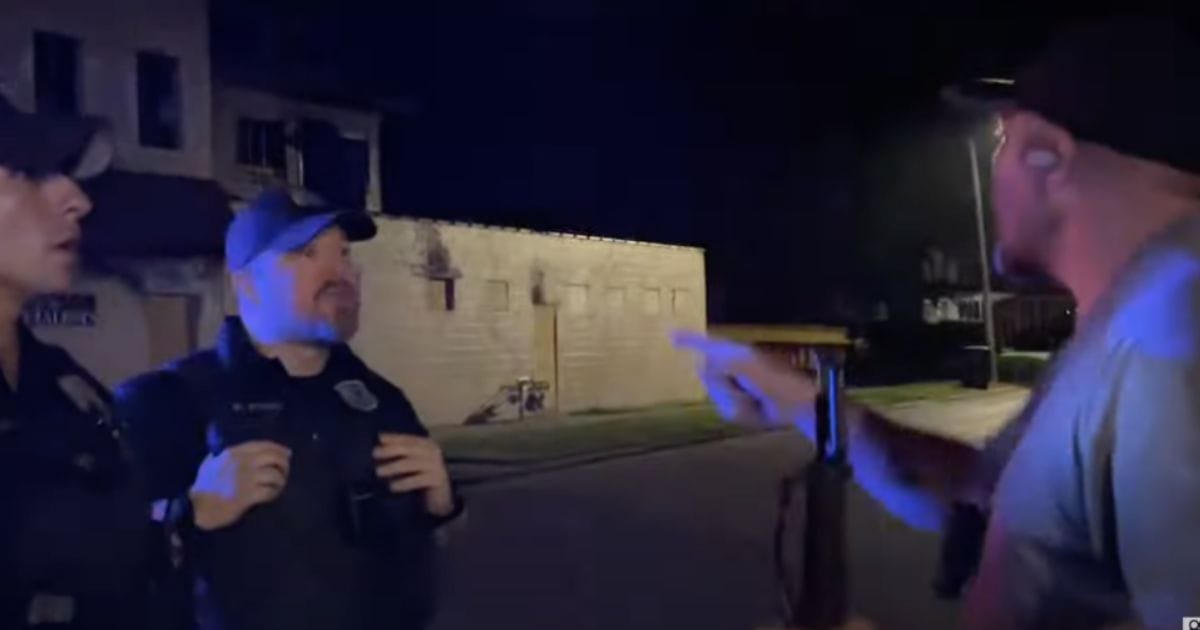Photo caption: A South Bend man who contributes to the “Freedom 2 Film” YouTube channel contends in a lawsuit filed Tuesday that Indiana’s new 25-foot “buffer zone” law unfairly prevented him from observing and recording the police during an incident in July. (Screenshot from Freedom to Film YouTube channel)
By Casey Smith, Indiana Capital Chronicle
A lawsuit filed in federal court by the American Civil Liberties Union of Indiana on Tuesday challenges a new state law that prohibits citizens from being within 25 feet of law enforcement officers.
The law, which went into effect on July 1, is called a violation of constitutional rights by the ACLU, which claims that citizens have a right to “observe and record the police.”
The nonprofit filed the lawsuit on behalf of a South Bend man who monitors activity of local law enforcement and claims the “encroachment” law violates his constitutional right to observe and record the police.
The plaintiff, Donald Nicodemus is a contributor to “Freedom 2 Film,” a YouTube channel that Nicodemus — who calls himself a citizen journalist — regularly posts videos to. The Freedom 2 Film channel had more than 24,000 subscribers as of Tuesday.
The lawsuit holds that South Bend police have already enforced the new law against Nicodemus “to prevent him from getting close enough to be able to observe and record their activities.”
“The unbridled discretion given to law enforcement officers by the new 25-foot law allows for, and invites content and viewpoint-based discrimination,” said Ken Falk, legal director at the ACLU of Indiana, in a prepared statement. “This gives police officers unchecked authority to prohibit citizens from approaching within 25 feet of the officers to observe their actions, even if the actions of the citizens are not and will not interfere with the police.”
At the urging of law enforcement officers, Indiana legislators earlier this year passed HEA 1186, a bill that creates a 25-foot “buffer zone” around officers conducting official duties. Crossing within that barrier is a Class C misdemeanor — which is punishable by up to 60 days in jail and a fine of up to $500.
Proponents of the legislation said that yelling and touching from bystanders can make an officer’s job more difficult and even dangerous while opponents argued it will erode accountability for law enforcement officers.
The bill has no exceptions for people who want to record police interaction, including the media.
Told to ‘move back’
According to the lawsuit, Nicodemus’s channel intends to “expose inappropriate or problematic law enforcement behavior, shining a light on it will help to end the behavior.”
But Nicodemus says police kept him from doing that — “with no basis” — during an incident last month.
According to the complaint, Nicodemus was observing and recording — via a livestream to “Freedom 2 Film” — an area of police activity on July 20, already from much further than 25 feet. The lawsuit alleges he was not interfering with the police investigation.
Nicodemus said in his complaint that he heard over his police scanner that shots had been fired in northwest South Bend. When he arrived, police were already present, and “there was no active shooting or any other unlawful activity taking place,” according to the lawsuit.
In the video recorded by Nicodemus, an officer is seen stepping off what he indicated was 25 feet from the location where Nicodemus and other observers were standing, telling them they had to move further away from the police activity. Profanity is used heavily in the video.
The complaint says that after about 12 minutes, another police officer approached Nicodemus and others who were gathered at the first officer’s 25-foot designated spot and said that area was located within his crime scene, and that everyone needed to move back another 25 feet.
That’s when the officer allegedly threatened those on the corner, including Nicodemus, saying they would go to jail if they did not move back another 25 feet, stating that there was a “new law.”
“The statute violates the First Amendment and is unconstitutional,” the lawsuit states. Nicodemus and the ACLU of Indiana are now seeking an injunction and attorneys fees from the United States District Court in the Northern District of Indiana. Their ultimate goal is to see the law deemed unconstitutional.
“The right of citizens to observe and record the police is a critical check and balance,” said Katie Blair, advocacy and public policy director at the ACLU of Indiana, in a statement. “Whether it’s a traffic stop, a police response to a mental health crisis, or other police-community interactions, community members cannot hold police officers accountable if they cannot observe what is going on.”
Past issues with ‘Freedom 2 Film’ in South Bend
Not mentioned in the lawsuit, however, is a past run-in Freedom 2 Film group members had with members of the South Bend Fire Department.
The South Bend Tribune reported that in August 2021, the city’s Board of Public Safety suspended a firefighter for five days, without pay, after his encounter with two men who were filming firefighters and police during an incident two months earlier.
Lance Gunderson was also ordered to complete anger management training, and was banned from signing up for overtime for 30 days as punishment for his behavior.
During the incident, Gunderson approached two people filming at the scene and exchanged words with them before he was seen physically bumping one of the men. A South Bend police officer intervened and spoke with the two men, who later filed a complaint with the department.
Recent News






